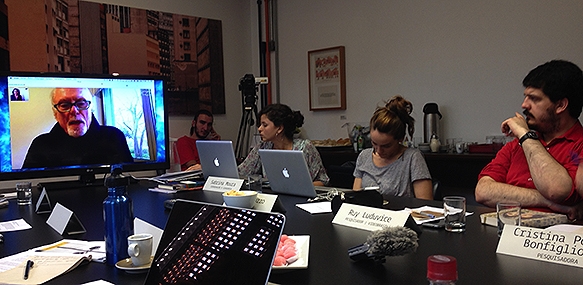Southern Observatory 3 | Geopolitics of Knowledge
Featuring the actress and illustrator Rita Carelli, writer Maria Elisa Cevasco and sociologist Walter Mignolo (via Skype), the third session of Southern Observatory revolved around the notion of “Geopolitics of Knowledge.” Borrowing the term from the discussions of the collective Modernidade/Colonialidade (M/C, Modernity/Coloniality), founded in the late 1990s by a group of Latin American intellectuals, the meeting set out to comprehend the nature of the historical and political struggles which naturalized knowledge conceals.
Can the West’s approach to science and knowledge coexist horizontally with different understandings of the world? How can one build a dialogue with agents and interlocutors that are not legitimized by formal institutions? And how can one erode the walls and institutional structures that contain our thinking? These questions, which have shaped previous Observatory debates, provided the starting point for the group to articulate the perspectives put forth by the guests’ practical and theoretical productions.
The video A Arca dos Z'oé (1993) opened the meeting, shedding light on the work of filmmaker and indigenist Vincent Carelli and his Vídeo nas Aldeias (VNA, or Video in the Villages) project. The piece was shown in São Paulo during the Unerasable Memories – a historic look at the Videobrasil Collection exhibit, which opened in 2014 at Sesc Pompeia and will be on an international tour in 2015 and 2016. Part of the trilogy comprising O Espírito da TV (1991) and Eu já fui seu Irmão (1993), this piece created by Carelli in partnership with the anthropologist Dominique Gallois shows the visit of indigenous people from the Waiãpi tribe to the village of the Zoé indigenous people, in Pará State’s backcountry. According to Rita Carelli, who kept track of these films’ production from an early stage, the piece reveals the power of audiovisual tools as a way of putting in check approaches that reduce the place of the contemporary indigenous person to mimicking an idealized, immutable past. Rita also presented to the group the children’s book collection Um dia na aldeia, released by publisher Cosac Naify. Edited under her coordination, the collection features six books and revisits stories told by several native peoples from across Brazil.
The second part of the meeting was a heated debate about the theoretical perspectives contributed by Walter Mignolo and Maria Elisa Cevasco. Speaking of the geopolitical disputes that characterize Eurocentric knowledge, Mignolo proposed a critique of the social sciences field, putting forth the notion of “decolonial turn”. Originally coined by the Puerto Rican Nelson Maldonado-Torres in 2005, the term revives a “theoretical and practical, political and epistemological resistance movement” (Ballestrin, 2013) in view of the logic of ideas advanced by the collective Modernidade/Colonialidade.
Finally, Maria Elisa Cevasco, the author of the book Dez Lições Sobre os Estudos Culturais (2003) discussed different definitions of culture, in light of the contributions made by Britain’s Raymond Williams to the Cultural Studies field. She tackled important points concerning the terminologies used by art and culture professionals, and stressed the need to restore historicity to our day-to-day lexicon.
Links and references:
CEVASCO, Maria Eliza. (2003). As Dez Lições Sobre os Estudos Culturais (Ten Lessons on Cultural Studies). São Paulo: Boitempo Editorial.
Decolonial Aesthetics Manifesto, M/C Modernidade/Colonialidade collective
VÍDEO NAS ALDEIAS (VIDEO IN THE VILLAGES). Youtube channel.
Um dia na aldeia (A day in the village), a collection coordinated by Rita Carelli


